Bhabha and Spivak: A Comparative Analysis of Postcolonialism
VerifiedAdded on 2023/06/09
|9
|2352
|130
Essay
AI Summary
This essay provides a comparative analysis of the postcolonial theories of Homi K. Bhabha and Gayatri Chakravorty Spivak. It begins by introducing postcolonialism as a critical study of the political, cultural, and economic legacy of imperialism. The essay then delves into the biographies and key concepts of each thinker. For Bhabha, the essay explores concepts like hybridity, ambivalence, mimicry, and false stereotypes, arguing that culture is transactional and rooted in displacement. For Spivak, the essay examines ethical responsibility, strategic essentialism, unlearning privilege, the subaltern, and margins/outside. The essay concludes by reflecting on the influence and contributions of each thinker to the field of postcolonial studies.
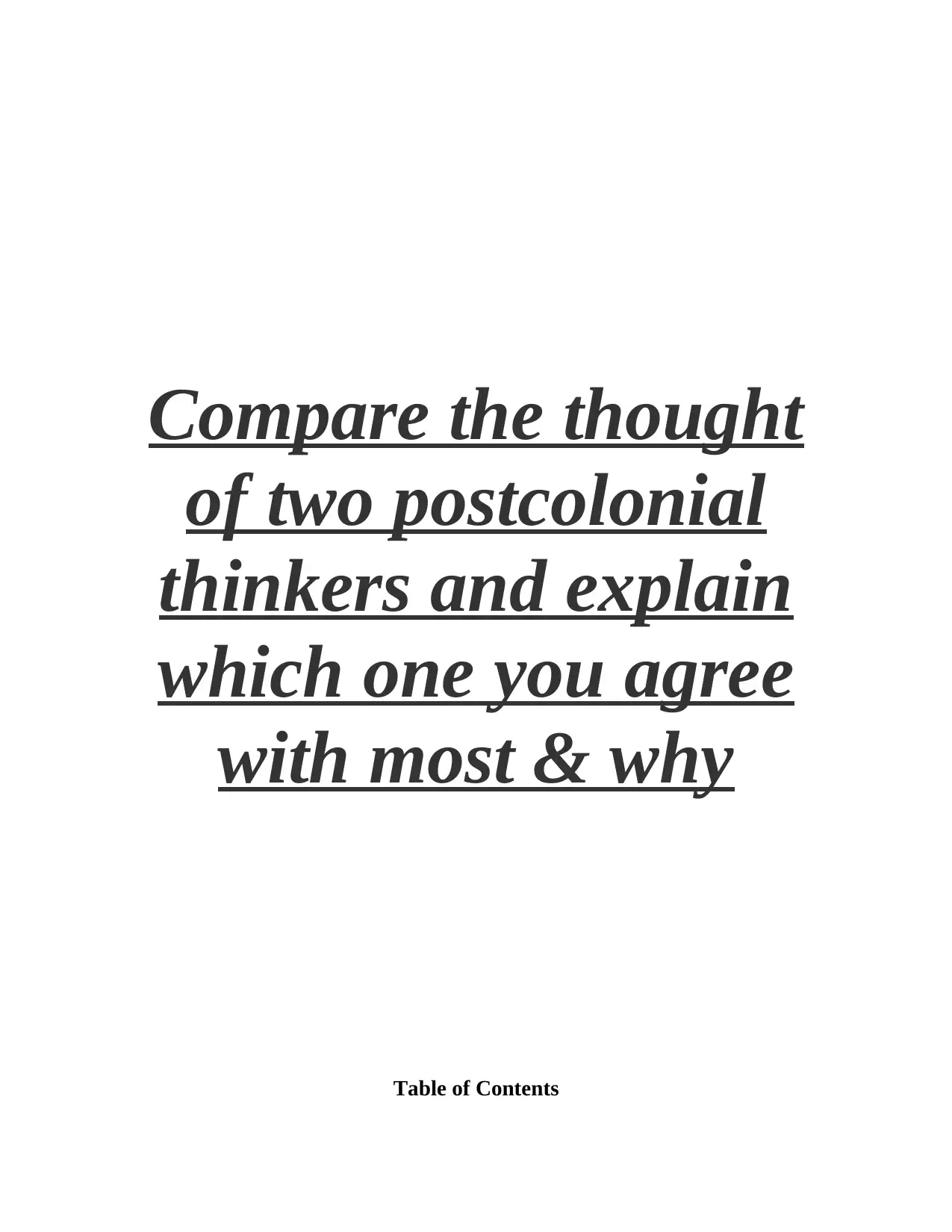
Compare the thought
of two postcolonial
thinkers and explain
which one you agree
with most & why
Table of Contents
of two postcolonial
thinkers and explain
which one you agree
with most & why
Table of Contents
Paraphrase This Document
Need a fresh take? Get an instant paraphrase of this document with our AI Paraphraser
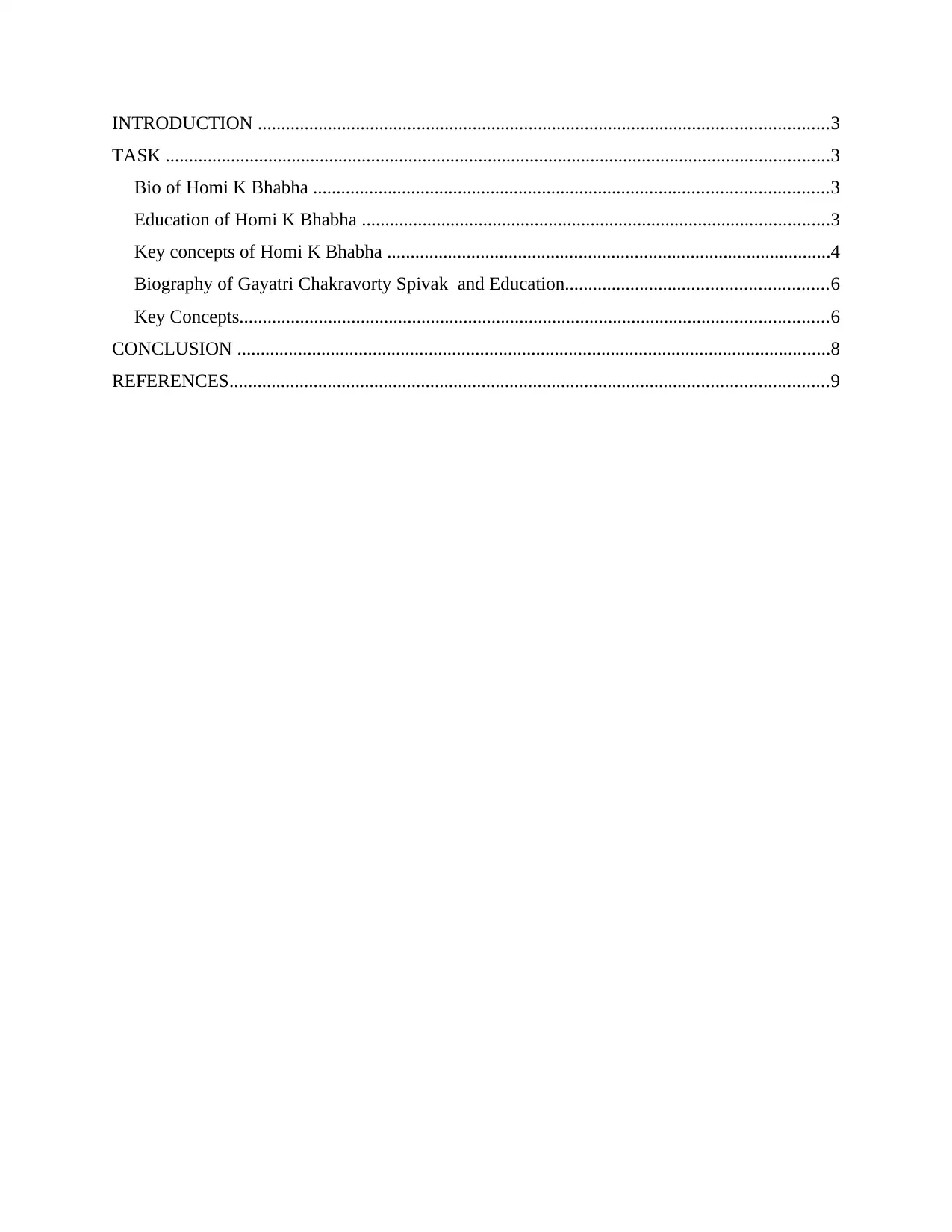
INTRODUCTION ..........................................................................................................................3
TASK ..............................................................................................................................................3
Bio of Homi K Bhabha ..............................................................................................................3
Education of Homi K Bhabha ....................................................................................................3
Key concepts of Homi K Bhabha ...............................................................................................4
Biography of Gayatri Chakravorty Spivak and Education........................................................6
Key Concepts..............................................................................................................................6
CONCLUSION ...............................................................................................................................8
REFERENCES................................................................................................................................9
TASK ..............................................................................................................................................3
Bio of Homi K Bhabha ..............................................................................................................3
Education of Homi K Bhabha ....................................................................................................3
Key concepts of Homi K Bhabha ...............................................................................................4
Biography of Gayatri Chakravorty Spivak and Education........................................................6
Key Concepts..............................................................................................................................6
CONCLUSION ...............................................................................................................................8
REFERENCES................................................................................................................................9
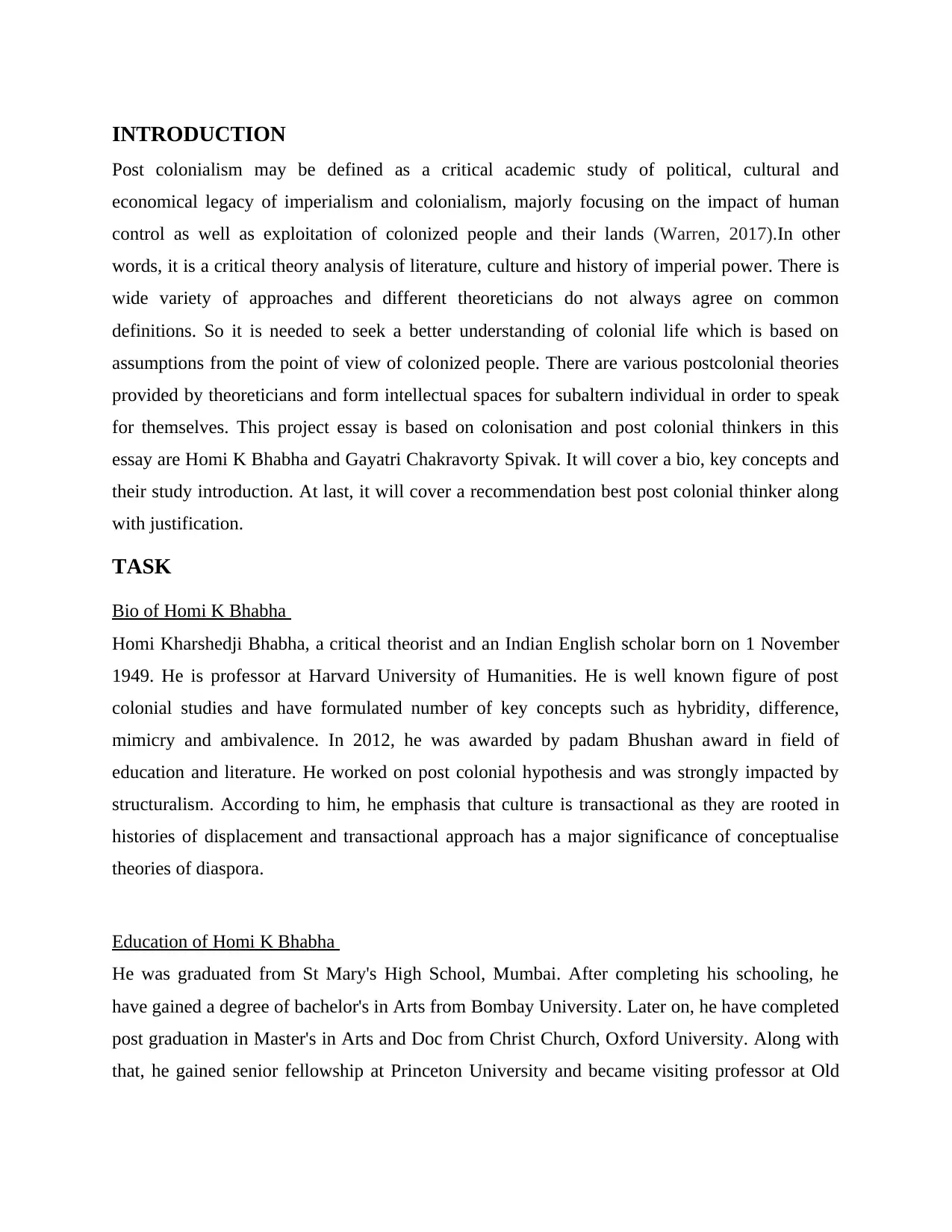
INTRODUCTION
Post colonialism may be defined as a critical academic study of political, cultural and
economical legacy of imperialism and colonialism, majorly focusing on the impact of human
control as well as exploitation of colonized people and their lands (Warren, 2017).In other
words, it is a critical theory analysis of literature, culture and history of imperial power. There is
wide variety of approaches and different theoreticians do not always agree on common
definitions. So it is needed to seek a better understanding of colonial life which is based on
assumptions from the point of view of colonized people. There are various postcolonial theories
provided by theoreticians and form intellectual spaces for subaltern individual in order to speak
for themselves. This project essay is based on colonisation and post colonial thinkers in this
essay are Homi K Bhabha and Gayatri Chakravorty Spivak. It will cover a bio, key concepts and
their study introduction. At last, it will cover a recommendation best post colonial thinker along
with justification.
TASK
Bio of Homi K Bhabha
Homi Kharshedji Bhabha, a critical theorist and an Indian English scholar born on 1 November
1949. He is professor at Harvard University of Humanities. He is well known figure of post
colonial studies and have formulated number of key concepts such as hybridity, difference,
mimicry and ambivalence. In 2012, he was awarded by padam Bhushan award in field of
education and literature. He worked on post colonial hypothesis and was strongly impacted by
structuralism. According to him, he emphasis that culture is transactional as they are rooted in
histories of displacement and transactional approach has a major significance of conceptualise
theories of diaspora.
Education of Homi K Bhabha
He was graduated from St Mary's High School, Mumbai. After completing his schooling, he
have gained a degree of bachelor's in Arts from Bombay University. Later on, he have completed
post graduation in Master's in Arts and Doc from Christ Church, Oxford University. Along with
that, he gained senior fellowship at Princeton University and became visiting professor at Old
Post colonialism may be defined as a critical academic study of political, cultural and
economical legacy of imperialism and colonialism, majorly focusing on the impact of human
control as well as exploitation of colonized people and their lands (Warren, 2017).In other
words, it is a critical theory analysis of literature, culture and history of imperial power. There is
wide variety of approaches and different theoreticians do not always agree on common
definitions. So it is needed to seek a better understanding of colonial life which is based on
assumptions from the point of view of colonized people. There are various postcolonial theories
provided by theoreticians and form intellectual spaces for subaltern individual in order to speak
for themselves. This project essay is based on colonisation and post colonial thinkers in this
essay are Homi K Bhabha and Gayatri Chakravorty Spivak. It will cover a bio, key concepts and
their study introduction. At last, it will cover a recommendation best post colonial thinker along
with justification.
TASK
Bio of Homi K Bhabha
Homi Kharshedji Bhabha, a critical theorist and an Indian English scholar born on 1 November
1949. He is professor at Harvard University of Humanities. He is well known figure of post
colonial studies and have formulated number of key concepts such as hybridity, difference,
mimicry and ambivalence. In 2012, he was awarded by padam Bhushan award in field of
education and literature. He worked on post colonial hypothesis and was strongly impacted by
structuralism. According to him, he emphasis that culture is transactional as they are rooted in
histories of displacement and transactional approach has a major significance of conceptualise
theories of diaspora.
Education of Homi K Bhabha
He was graduated from St Mary's High School, Mumbai. After completing his schooling, he
have gained a degree of bachelor's in Arts from Bombay University. Later on, he have completed
post graduation in Master's in Arts and Doc from Christ Church, Oxford University. Along with
that, he gained senior fellowship at Princeton University and became visiting professor at Old
⊘ This is a preview!⊘
Do you want full access?
Subscribe today to unlock all pages.

Trusted by 1+ million students worldwide
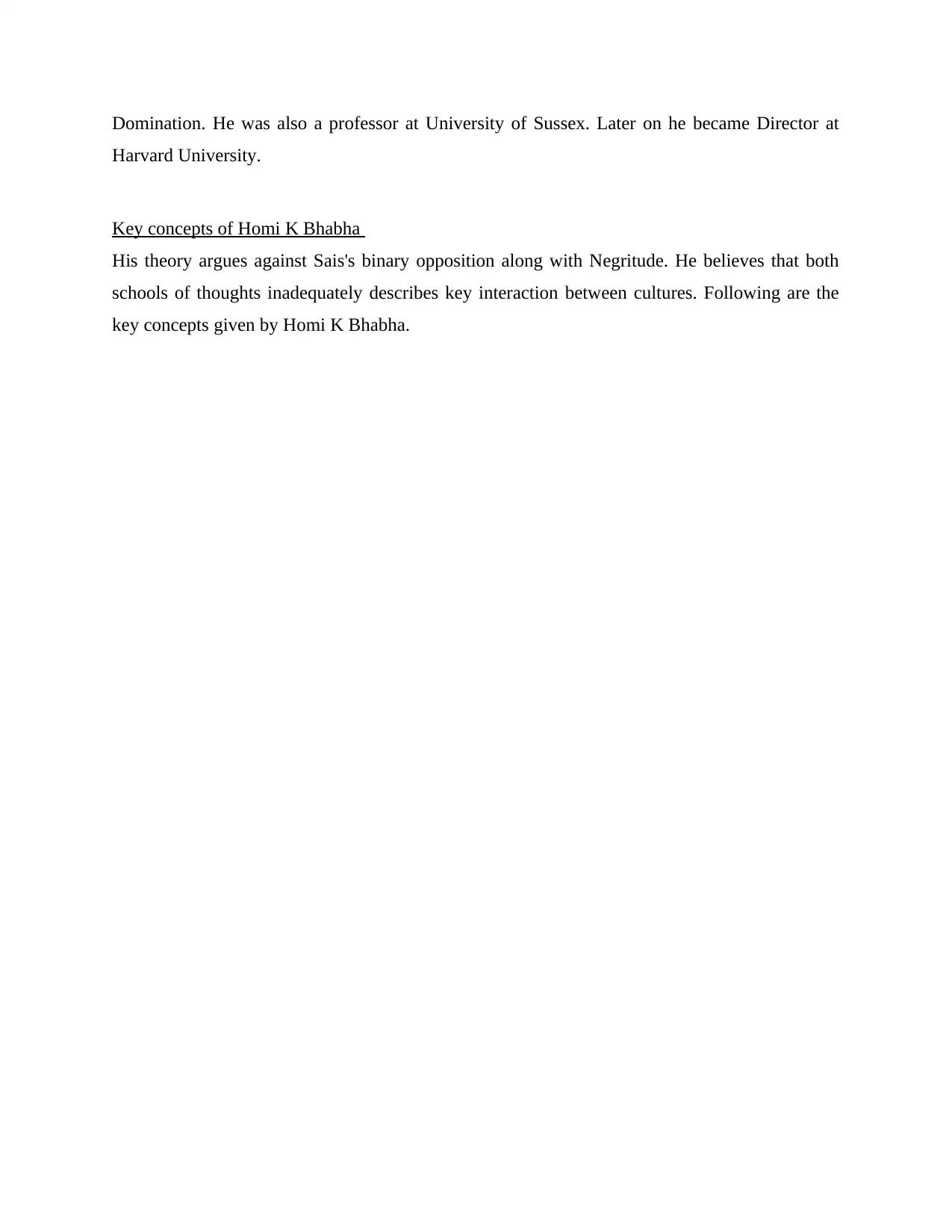
Domination. He was also a professor at University of Sussex. Later on he became Director at
Harvard University.
Key concepts of Homi K Bhabha
His theory argues against Sais's binary opposition along with Negritude. He believes that both
schools of thoughts inadequately describes key interaction between cultures. Following are the
key concepts given by Homi K Bhabha.
Harvard University.
Key concepts of Homi K Bhabha
His theory argues against Sais's binary opposition along with Negritude. He believes that both
schools of thoughts inadequately describes key interaction between cultures. Following are the
key concepts given by Homi K Bhabha.
Paraphrase This Document
Need a fresh take? Get an instant paraphrase of this document with our AI Paraphraser
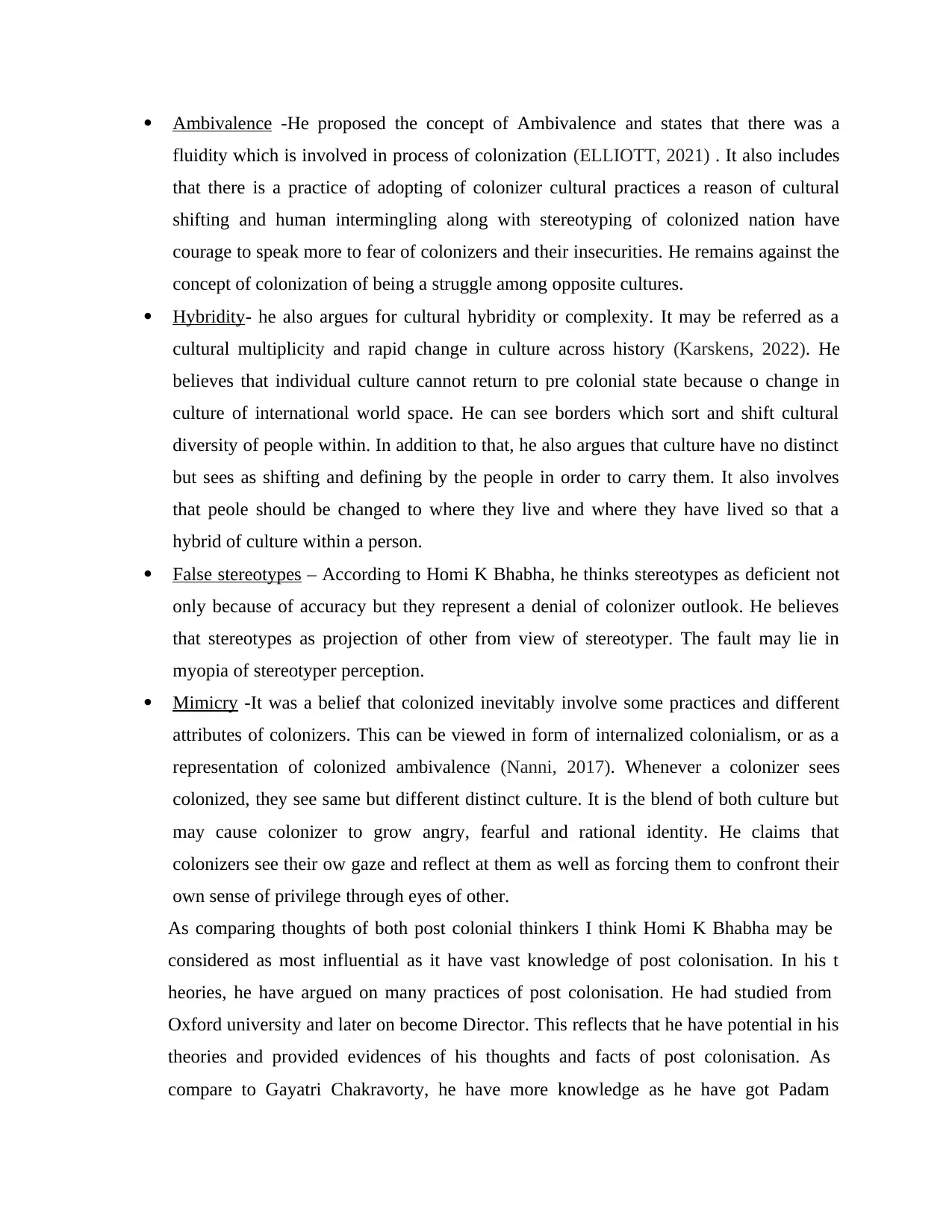
Ambivalence -He proposed the concept of Ambivalence and states that there was a
fluidity which is involved in process of colonization (ELLIOTT, 2021) . It also includes
that there is a practice of adopting of colonizer cultural practices a reason of cultural
shifting and human intermingling along with stereotyping of colonized nation have
courage to speak more to fear of colonizers and their insecurities. He remains against the
concept of colonization of being a struggle among opposite cultures.
Hybridity- he also argues for cultural hybridity or complexity. It may be referred as a
cultural multiplicity and rapid change in culture across history (Karskens, 2022). He
believes that individual culture cannot return to pre colonial state because o change in
culture of international world space. He can see borders which sort and shift cultural
diversity of people within. In addition to that, he also argues that culture have no distinct
but sees as shifting and defining by the people in order to carry them. It also involves
that peole should be changed to where they live and where they have lived so that a
hybrid of culture within a person.
False stereotypes – According to Homi K Bhabha, he thinks stereotypes as deficient not
only because of accuracy but they represent a denial of colonizer outlook. He believes
that stereotypes as projection of other from view of stereotyper. The fault may lie in
myopia of stereotyper perception.
Mimicry -It was a belief that colonized inevitably involve some practices and different
attributes of colonizers. This can be viewed in form of internalized colonialism, or as a
representation of colonized ambivalence (Nanni, 2017). Whenever a colonizer sees
colonized, they see same but different distinct culture. It is the blend of both culture but
may cause colonizer to grow angry, fearful and rational identity. He claims that
colonizers see their ow gaze and reflect at them as well as forcing them to confront their
own sense of privilege through eyes of other.
As comparing thoughts of both post colonial thinkers I think Homi K Bhabha may be
considered as most influential as it have vast knowledge of post colonisation. In his t
heories, he have argued on many practices of post colonisation. He had studied from
Oxford university and later on become Director. This reflects that he have potential in his
theories and provided evidences of his thoughts and facts of post colonisation. As
compare to Gayatri Chakravorty, he have more knowledge as he have got Padam
fluidity which is involved in process of colonization (ELLIOTT, 2021) . It also includes
that there is a practice of adopting of colonizer cultural practices a reason of cultural
shifting and human intermingling along with stereotyping of colonized nation have
courage to speak more to fear of colonizers and their insecurities. He remains against the
concept of colonization of being a struggle among opposite cultures.
Hybridity- he also argues for cultural hybridity or complexity. It may be referred as a
cultural multiplicity and rapid change in culture across history (Karskens, 2022). He
believes that individual culture cannot return to pre colonial state because o change in
culture of international world space. He can see borders which sort and shift cultural
diversity of people within. In addition to that, he also argues that culture have no distinct
but sees as shifting and defining by the people in order to carry them. It also involves
that peole should be changed to where they live and where they have lived so that a
hybrid of culture within a person.
False stereotypes – According to Homi K Bhabha, he thinks stereotypes as deficient not
only because of accuracy but they represent a denial of colonizer outlook. He believes
that stereotypes as projection of other from view of stereotyper. The fault may lie in
myopia of stereotyper perception.
Mimicry -It was a belief that colonized inevitably involve some practices and different
attributes of colonizers. This can be viewed in form of internalized colonialism, or as a
representation of colonized ambivalence (Nanni, 2017). Whenever a colonizer sees
colonized, they see same but different distinct culture. It is the blend of both culture but
may cause colonizer to grow angry, fearful and rational identity. He claims that
colonizers see their ow gaze and reflect at them as well as forcing them to confront their
own sense of privilege through eyes of other.
As comparing thoughts of both post colonial thinkers I think Homi K Bhabha may be
considered as most influential as it have vast knowledge of post colonisation. In his t
heories, he have argued on many practices of post colonisation. He had studied from
Oxford university and later on become Director. This reflects that he have potential in his
theories and provided evidences of his thoughts and facts of post colonisation. As
compare to Gayatri Chakravorty, he have more knowledge as he have got Padam
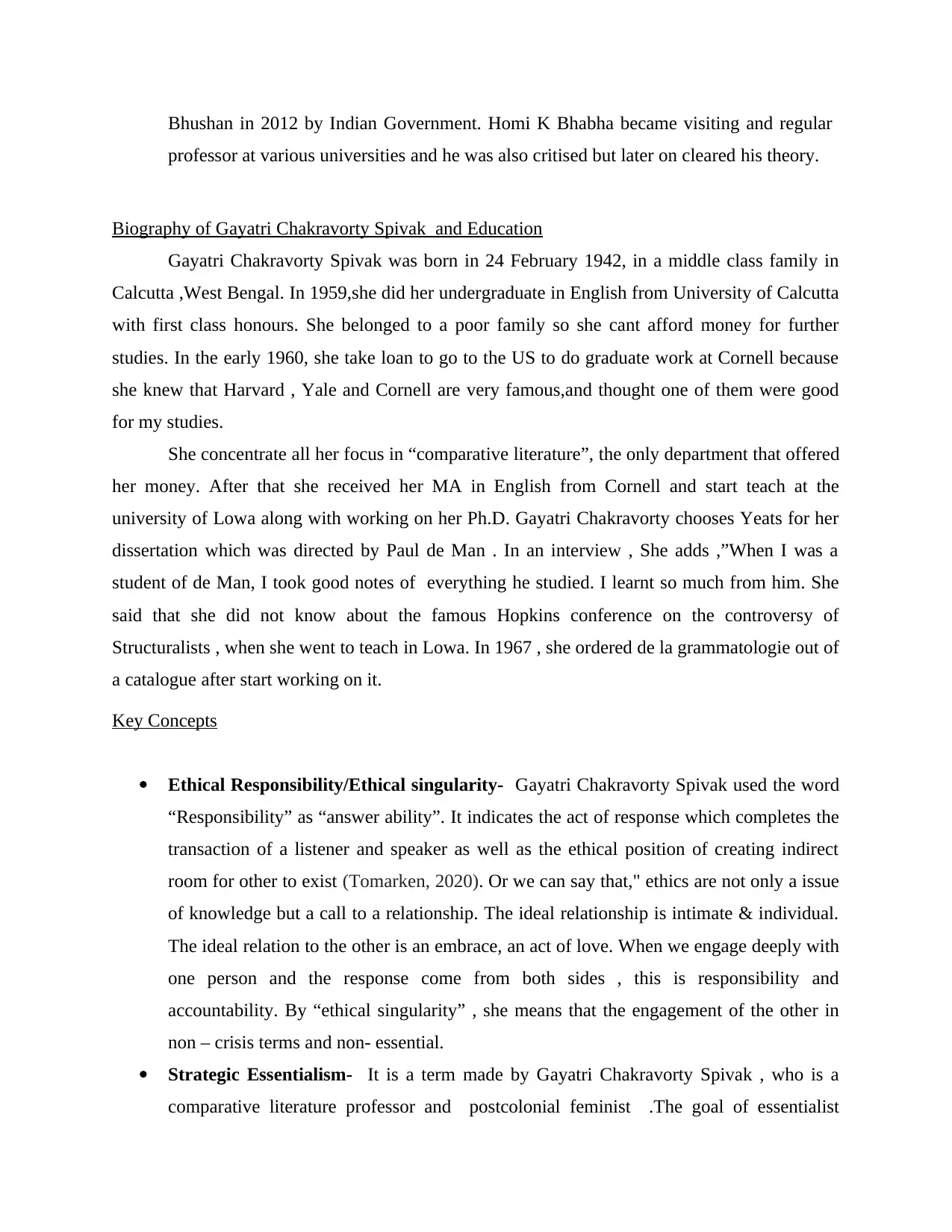
Bhushan in 2012 by Indian Government. Homi K Bhabha became visiting and regular
professor at various universities and he was also critised but later on cleared his theory.
Biography of Gayatri Chakravorty Spivak and Education
Gayatri Chakravorty Spivak was born in 24 February 1942, in a middle class family in
Calcutta ,West Bengal. In 1959,she did her undergraduate in English from University of Calcutta
with first class honours. She belonged to a poor family so she cant afford money for further
studies. In the early 1960, she take loan to go to the US to do graduate work at Cornell because
she knew that Harvard , Yale and Cornell are very famous,and thought one of them were good
for my studies.
She concentrate all her focus in “comparative literature”, the only department that offered
her money. After that she received her MA in English from Cornell and start teach at the
university of Lowa along with working on her Ph.D. Gayatri Chakravorty chooses Yeats for her
dissertation which was directed by Paul de Man . In an interview , She adds ,”When I was a
student of de Man, I took good notes of everything he studied. I learnt so much from him. She
said that she did not know about the famous Hopkins conference on the controversy of
Structuralists , when she went to teach in Lowa. In 1967 , she ordered de la grammatologie out of
a catalogue after start working on it.
Key Concepts
Ethical Responsibility/Ethical singularity- Gayatri Chakravorty Spivak used the word
“Responsibility” as “answer ability”. It indicates the act of response which completes the
transaction of a listener and speaker as well as the ethical position of creating indirect
room for other to exist (Tomarken, 2020). Or we can say that," ethics are not only a issue
of knowledge but a call to a relationship. The ideal relationship is intimate & individual.
The ideal relation to the other is an embrace, an act of love. When we engage deeply with
one person and the response come from both sides , this is responsibility and
accountability. By “ethical singularity” , she means that the engagement of the other in
non – crisis terms and non- essential.
Strategic Essentialism- It is a term made by Gayatri Chakravorty Spivak , who is a
comparative literature professor and postcolonial feminist .The goal of essentialist
professor at various universities and he was also critised but later on cleared his theory.
Biography of Gayatri Chakravorty Spivak and Education
Gayatri Chakravorty Spivak was born in 24 February 1942, in a middle class family in
Calcutta ,West Bengal. In 1959,she did her undergraduate in English from University of Calcutta
with first class honours. She belonged to a poor family so she cant afford money for further
studies. In the early 1960, she take loan to go to the US to do graduate work at Cornell because
she knew that Harvard , Yale and Cornell are very famous,and thought one of them were good
for my studies.
She concentrate all her focus in “comparative literature”, the only department that offered
her money. After that she received her MA in English from Cornell and start teach at the
university of Lowa along with working on her Ph.D. Gayatri Chakravorty chooses Yeats for her
dissertation which was directed by Paul de Man . In an interview , She adds ,”When I was a
student of de Man, I took good notes of everything he studied. I learnt so much from him. She
said that she did not know about the famous Hopkins conference on the controversy of
Structuralists , when she went to teach in Lowa. In 1967 , she ordered de la grammatologie out of
a catalogue after start working on it.
Key Concepts
Ethical Responsibility/Ethical singularity- Gayatri Chakravorty Spivak used the word
“Responsibility” as “answer ability”. It indicates the act of response which completes the
transaction of a listener and speaker as well as the ethical position of creating indirect
room for other to exist (Tomarken, 2020). Or we can say that," ethics are not only a issue
of knowledge but a call to a relationship. The ideal relationship is intimate & individual.
The ideal relation to the other is an embrace, an act of love. When we engage deeply with
one person and the response come from both sides , this is responsibility and
accountability. By “ethical singularity” , she means that the engagement of the other in
non – crisis terms and non- essential.
Strategic Essentialism- It is a term made by Gayatri Chakravorty Spivak , who is a
comparative literature professor and postcolonial feminist .The goal of essentialist
⊘ This is a preview!⊘
Do you want full access?
Subscribe today to unlock all pages.

Trusted by 1+ million students worldwide
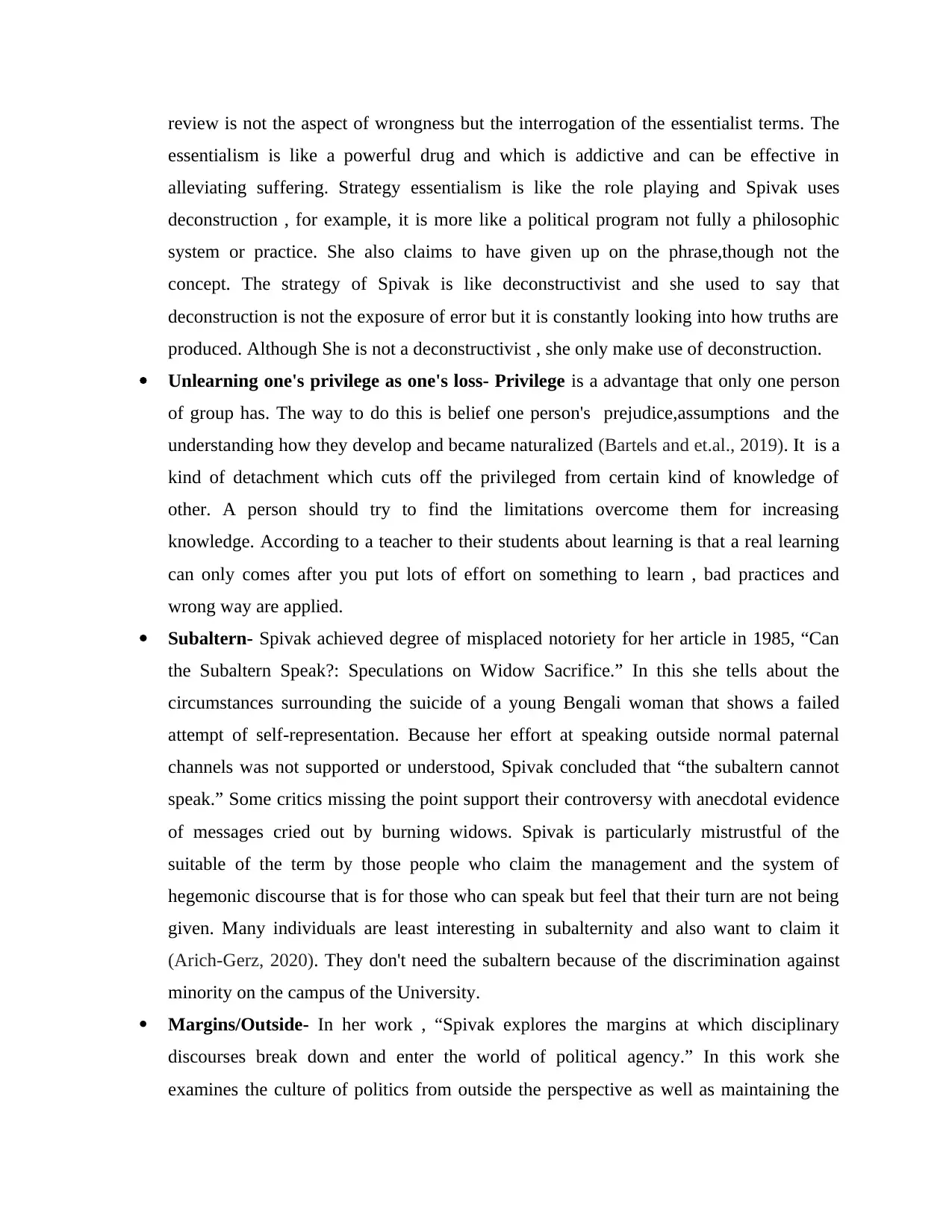
review is not the aspect of wrongness but the interrogation of the essentialist terms. The
essentialism is like a powerful drug and which is addictive and can be effective in
alleviating suffering. Strategy essentialism is like the role playing and Spivak uses
deconstruction , for example, it is more like a political program not fully a philosophic
system or practice. She also claims to have given up on the phrase,though not the
concept. The strategy of Spivak is like deconstructivist and she used to say that
deconstruction is not the exposure of error but it is constantly looking into how truths are
produced. Although She is not a deconstructivist , she only make use of deconstruction.
Unlearning one's privilege as one's loss- Privilege is a advantage that only one person
of group has. The way to do this is belief one person's prejudice,assumptions and the
understanding how they develop and became naturalized (Bartels and et.al., 2019). It is a
kind of detachment which cuts off the privileged from certain kind of knowledge of
other. A person should try to find the limitations overcome them for increasing
knowledge. According to a teacher to their students about learning is that a real learning
can only comes after you put lots of effort on something to learn , bad practices and
wrong way are applied.
Subaltern- Spivak achieved degree of misplaced notoriety for her article in 1985, “Can
the Subaltern Speak?: Speculations on Widow Sacrifice.” In this she tells about the
circumstances surrounding the suicide of a young Bengali woman that shows a failed
attempt of self-representation. Because her effort at speaking outside normal paternal
channels was not supported or understood, Spivak concluded that “the subaltern cannot
speak.” Some critics missing the point support their controversy with anecdotal evidence
of messages cried out by burning widows. Spivak is particularly mistrustful of the
suitable of the term by those people who claim the management and the system of
hegemonic discourse that is for those who can speak but feel that their turn are not being
given. Many individuals are least interesting in subalternity and also want to claim it
(Arich-Gerz, 2020). They don't need the subaltern because of the discrimination against
minority on the campus of the University.
Margins/Outside- In her work , “Spivak explores the margins at which disciplinary
discourses break down and enter the world of political agency.” In this work she
examines the culture of politics from outside the perspective as well as maintaining the
essentialism is like a powerful drug and which is addictive and can be effective in
alleviating suffering. Strategy essentialism is like the role playing and Spivak uses
deconstruction , for example, it is more like a political program not fully a philosophic
system or practice. She also claims to have given up on the phrase,though not the
concept. The strategy of Spivak is like deconstructivist and she used to say that
deconstruction is not the exposure of error but it is constantly looking into how truths are
produced. Although She is not a deconstructivist , she only make use of deconstruction.
Unlearning one's privilege as one's loss- Privilege is a advantage that only one person
of group has. The way to do this is belief one person's prejudice,assumptions and the
understanding how they develop and became naturalized (Bartels and et.al., 2019). It is a
kind of detachment which cuts off the privileged from certain kind of knowledge of
other. A person should try to find the limitations overcome them for increasing
knowledge. According to a teacher to their students about learning is that a real learning
can only comes after you put lots of effort on something to learn , bad practices and
wrong way are applied.
Subaltern- Spivak achieved degree of misplaced notoriety for her article in 1985, “Can
the Subaltern Speak?: Speculations on Widow Sacrifice.” In this she tells about the
circumstances surrounding the suicide of a young Bengali woman that shows a failed
attempt of self-representation. Because her effort at speaking outside normal paternal
channels was not supported or understood, Spivak concluded that “the subaltern cannot
speak.” Some critics missing the point support their controversy with anecdotal evidence
of messages cried out by burning widows. Spivak is particularly mistrustful of the
suitable of the term by those people who claim the management and the system of
hegemonic discourse that is for those who can speak but feel that their turn are not being
given. Many individuals are least interesting in subalternity and also want to claim it
(Arich-Gerz, 2020). They don't need the subaltern because of the discrimination against
minority on the campus of the University.
Margins/Outside- In her work , “Spivak explores the margins at which disciplinary
discourses break down and enter the world of political agency.” In this work she
examines the culture of politics from outside the perspective as well as maintaining the
Paraphrase This Document
Need a fresh take? Get an instant paraphrase of this document with our AI Paraphraser
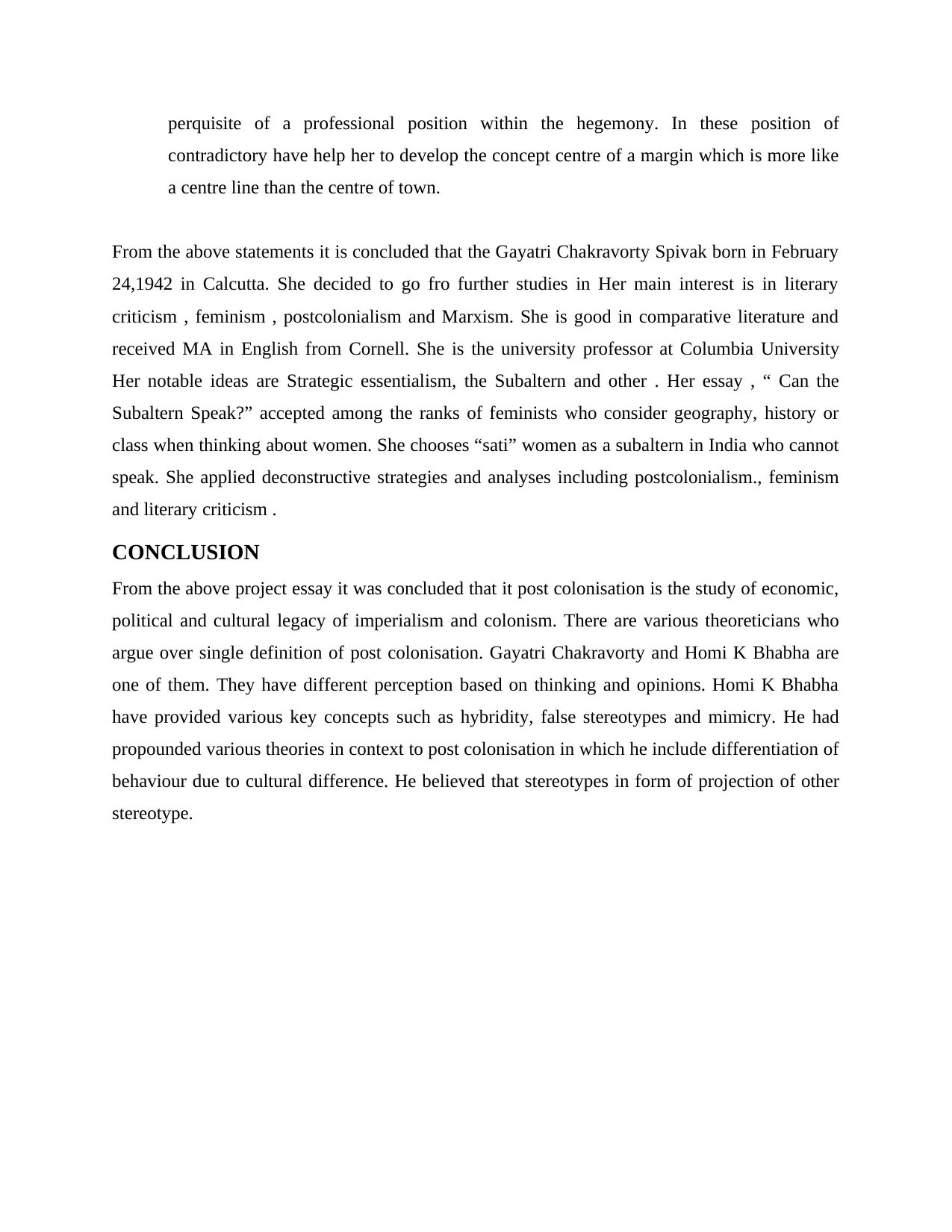
perquisite of a professional position within the hegemony. In these position of
contradictory have help her to develop the concept centre of a margin which is more like
a centre line than the centre of town.
From the above statements it is concluded that the Gayatri Chakravorty Spivak born in February
24,1942 in Calcutta. She decided to go fro further studies in Her main interest is in literary
criticism , feminism , postcolonialism and Marxism. She is good in comparative literature and
received MA in English from Cornell. She is the university professor at Columbia University
Her notable ideas are Strategic essentialism, the Subaltern and other . Her essay , “ Can the
Subaltern Speak?” accepted among the ranks of feminists who consider geography, history or
class when thinking about women. She chooses “sati” women as a subaltern in India who cannot
speak. She applied deconstructive strategies and analyses including postcolonialism., feminism
and literary criticism .
CONCLUSION
From the above project essay it was concluded that it post colonisation is the study of economic,
political and cultural legacy of imperialism and colonism. There are various theoreticians who
argue over single definition of post colonisation. Gayatri Chakravorty and Homi K Bhabha are
one of them. They have different perception based on thinking and opinions. Homi K Bhabha
have provided various key concepts such as hybridity, false stereotypes and mimicry. He had
propounded various theories in context to post colonisation in which he include differentiation of
behaviour due to cultural difference. He believed that stereotypes in form of projection of other
stereotype.
contradictory have help her to develop the concept centre of a margin which is more like
a centre line than the centre of town.
From the above statements it is concluded that the Gayatri Chakravorty Spivak born in February
24,1942 in Calcutta. She decided to go fro further studies in Her main interest is in literary
criticism , feminism , postcolonialism and Marxism. She is good in comparative literature and
received MA in English from Cornell. She is the university professor at Columbia University
Her notable ideas are Strategic essentialism, the Subaltern and other . Her essay , “ Can the
Subaltern Speak?” accepted among the ranks of feminists who consider geography, history or
class when thinking about women. She chooses “sati” women as a subaltern in India who cannot
speak. She applied deconstructive strategies and analyses including postcolonialism., feminism
and literary criticism .
CONCLUSION
From the above project essay it was concluded that it post colonisation is the study of economic,
political and cultural legacy of imperialism and colonism. There are various theoreticians who
argue over single definition of post colonisation. Gayatri Chakravorty and Homi K Bhabha are
one of them. They have different perception based on thinking and opinions. Homi K Bhabha
have provided various key concepts such as hybridity, false stereotypes and mimicry. He had
propounded various theories in context to post colonisation in which he include differentiation of
behaviour due to cultural difference. He believed that stereotypes in form of projection of other
stereotype.
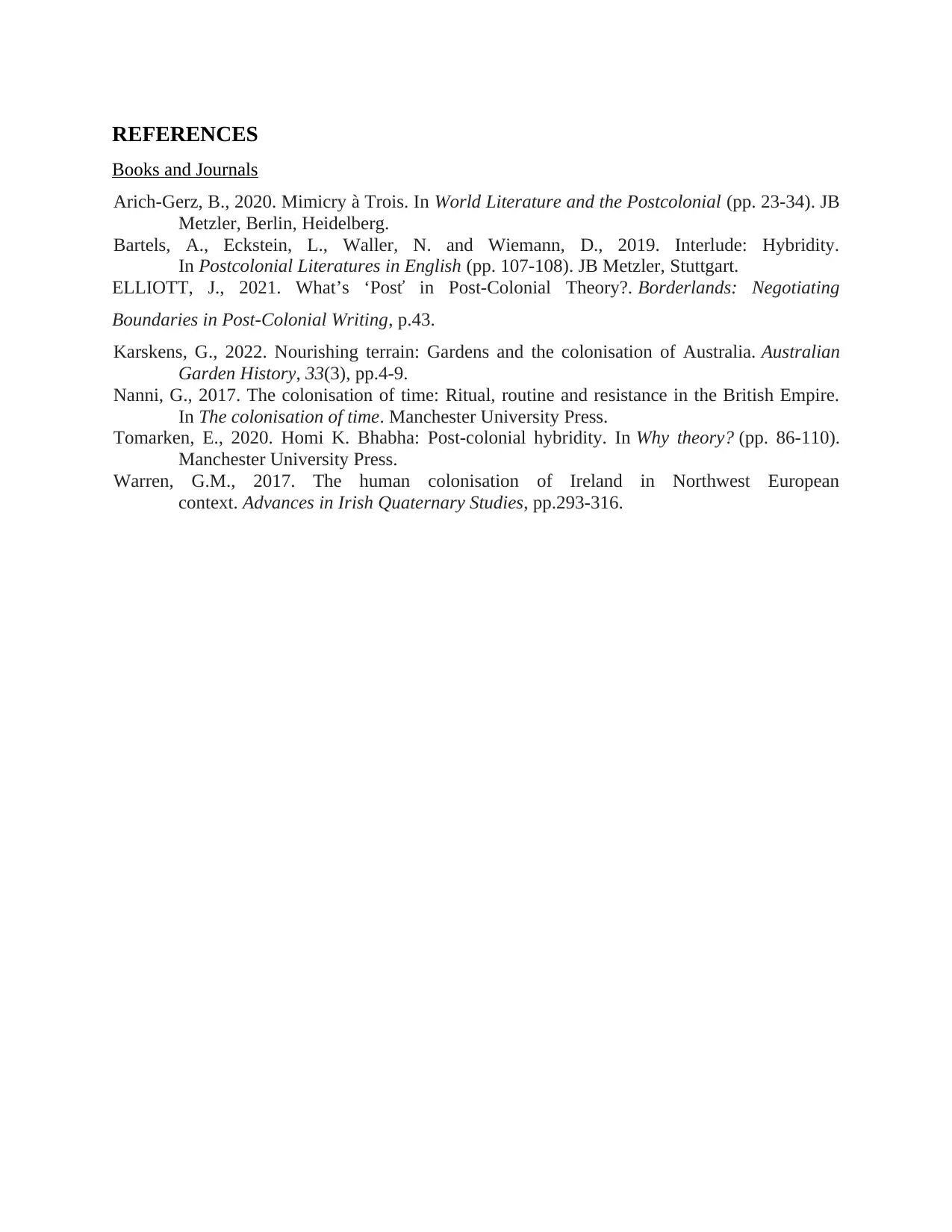
REFERENCES
Books and Journals
Arich-Gerz, B., 2020. Mimicry à Trois. In World Literature and the Postcolonial (pp. 23-34). JB
Metzler, Berlin, Heidelberg.
Bartels, A., Eckstein, L., Waller, N. and Wiemann, D., 2019. Interlude: Hybridity.
In Postcolonial Literatures in English (pp. 107-108). JB Metzler, Stuttgart.
ELLIOTT, J., 2021. What’s ‘Posť in Post-Colonial Theory?. Borderlands: Negotiating
Boundaries in Post-Colonial Writing, p.43.
Karskens, G., 2022. Nourishing terrain: Gardens and the colonisation of Australia. Australian
Garden History, 33(3), pp.4-9.
Nanni, G., 2017. The colonisation of time: Ritual, routine and resistance in the British Empire.
In The colonisation of time. Manchester University Press.
Tomarken, E., 2020. Homi K. Bhabha: Post-colonial hybridity. In Why theory? (pp. 86-110).
Manchester University Press.
Warren, G.M., 2017. The human colonisation of Ireland in Northwest European
context. Advances in Irish Quaternary Studies, pp.293-316.
Books and Journals
Arich-Gerz, B., 2020. Mimicry à Trois. In World Literature and the Postcolonial (pp. 23-34). JB
Metzler, Berlin, Heidelberg.
Bartels, A., Eckstein, L., Waller, N. and Wiemann, D., 2019. Interlude: Hybridity.
In Postcolonial Literatures in English (pp. 107-108). JB Metzler, Stuttgart.
ELLIOTT, J., 2021. What’s ‘Posť in Post-Colonial Theory?. Borderlands: Negotiating
Boundaries in Post-Colonial Writing, p.43.
Karskens, G., 2022. Nourishing terrain: Gardens and the colonisation of Australia. Australian
Garden History, 33(3), pp.4-9.
Nanni, G., 2017. The colonisation of time: Ritual, routine and resistance in the British Empire.
In The colonisation of time. Manchester University Press.
Tomarken, E., 2020. Homi K. Bhabha: Post-colonial hybridity. In Why theory? (pp. 86-110).
Manchester University Press.
Warren, G.M., 2017. The human colonisation of Ireland in Northwest European
context. Advances in Irish Quaternary Studies, pp.293-316.
⊘ This is a preview!⊘
Do you want full access?
Subscribe today to unlock all pages.

Trusted by 1+ million students worldwide
1 out of 9
Your All-in-One AI-Powered Toolkit for Academic Success.
+13062052269
info@desklib.com
Available 24*7 on WhatsApp / Email
![[object Object]](/_next/static/media/star-bottom.7253800d.svg)
Unlock your academic potential
Copyright © 2020–2026 A2Z Services. All Rights Reserved. Developed and managed by ZUCOL.